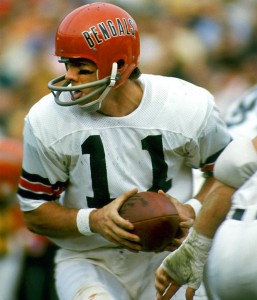Yesterday, I began looking at how the 12 expansion teams of the modern era fared during their first 13 years of existence. Today, the bottom half of the list:
#6 Cincinnati Bengals (1968-1980)
Art Modell purchased the Browns in 1961; Modell and Paul Brown, the only coach the franchise had ever known, clashed almost immediately. In January 1963, Modell fired Brown, who began plotting his revenge almost immediately. At the time, the AFL was gaining traction, but Brown had no desire to be in a “lesser” league. By the time the AFL had decided to add Cincinnati as an expansion franchise, the AFL and NFL had already agreed to merge prior to the start of the 1970 season. Brown was part of the ownership group that brought the Bengals into professional football, and became the team’s first head coach. One of his first decisions? Hiring a young Bill Walsh.
The Bengals played like a typical expansion team in 1968, but their hopes seemed to change the following season. With the 5th pick in the 1969 draft [1]The AFL and NFL had a common draft beginning in 1967; the Bengals, with the second worst record in the league, ended up with only the fifth pick in the draft, causing them to miss out on O.J. Simpson … Continue reading, Brown didn’t have to look far: he selected Cincinnati signal caller Greg Cook. The former Bearcat was an immediate star: his 9.4 yards per attempt average remains the highest ever by a rookie quarterback with at least 175 pass attempts. Cook led the AFL in completion percentage, yards per attempt and quarterback rating, but was mostly known for his powerful arm. His 17.5 yards per completion average that season has only been bested once since, and it remains the 12th highest mark in league history. Making the season more incredible was that Cook tore his rotator cuff against the Chiefs… in week three. Following surgery to repair his shoulder, Cook threw just three more passes, prompting many to wonder how great he could have been.
[continue reading…]
References
| ↑1 | The AFL and NFL had a common draft beginning in 1967; the Bengals, with the second worst record in the league, ended up with only the fifth pick in the draft, causing them to miss out on O.J. Simpson and Joe Greene. |
|---|

